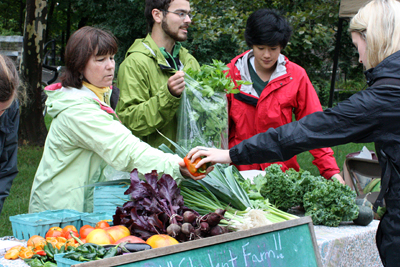Organic farm coordinator offers support from the ground up
By Mary Woodsen

Betsy Leonard '81 is at the wheel of a 45 horsepower John Deere tractor -- "a nice size for a small grower," she says -- and pulling a flail mower. As the Cornell University Agricultural Experiment Station's new organic farm coordinator, she's making her first pass over an organic cover crop at an ag station research plot. Behind her, chopped and shredded plants fly every which way over the stubble. The plot looks like a bad day at the barbershop, but Leonard isn't done. Coming back the other way, she makes a second pass, reducing the stubble to the cover crop equivalent of a bad shave.
Leonard is readying the site for Cornell research scientist Anu Rangarajan, who wants to see how well this cover crop can prevent erosion, keep weeds at bay, provide fertile ground for the transplants that will go into strips tilled through the stubble next week -- and save money. Growers tell Leonard and Rangarajan that they save up to 60 percent of their costs with some of these new tillage techniques.
A typical day could have Leonard mowing cover crops one minute or fine-tuning an experimental bioremediation plot the next. Her job: to support the Cornell scientists seeking sustainable solutions to the common or emerging problems organic growers face -- solutions that often benefit conventional growers as well.
Leonard also provides oversight for the student-run Dilmun Hill Farm, which provides proving grounds for a range of undergraduate research projects as well as hands-on experience in managing a real-world organic farm. Members Dilmun participate in seminars and host Cornell classes and laboratory sessions in horticulture, sociology and soil science.
Farming is in Leonard's blood. She grew up on a third-generation, 200-acre vegetable and you-pick berry farm just east of Cayuga Lake that her three sisters still run. In high school, Leonard routinely scouted the farm to monitor such pests as tarnished plant bugs -- a pest of many fruits and vegetables -- and strawberry "clippers" or bud weevils. Her records helped her family convert to "integrated pest management" strategies for more targeted spraying and pest control developed at Cornell to break away from the routine and systematic "calendar sprays" then common in conventional agriculture.
After earning her associate degree in agriculture at SUNY Cobleskill and her bachelor's at Cornell, Leonard worked on the family farm through her first years of motherhood with baby in tow. But she wanted to do more. She was interested in practical research farmers could use in the field to make their operations more sustainable on every front, economically as well as environmentally.
By the mid-1990s Leonard was working full time as a research technician at Cornell, which served as good preparation for her new position, especially given her responsibilities for Dilmun Hill. "Over the years so many students on Betsy's field crews have told me that it was the best job they ever had," says Rangarajan. "She's amazing."
"Betsy's so calm and relaxed but so responsive," says Elizabeth Goodwin '12, who heads up a soil remediation project at Dilmun Hill. "She puts the power and the tools in our hands for the research we do. She wants us to succeed."
Mary Woodsen is a science writer with the Cornell University Agricultural Experiment Station.
Media Contact
Get Cornell news delivered right to your inbox.
Subscribe